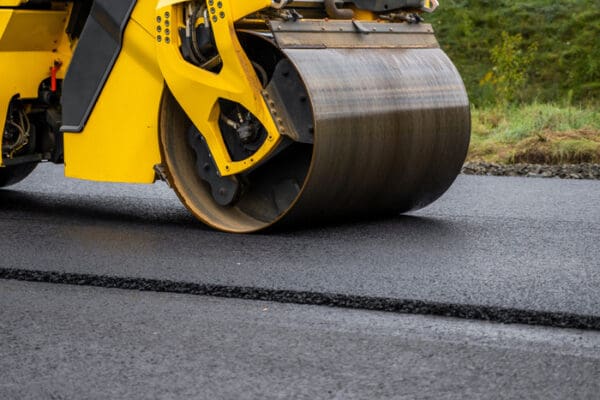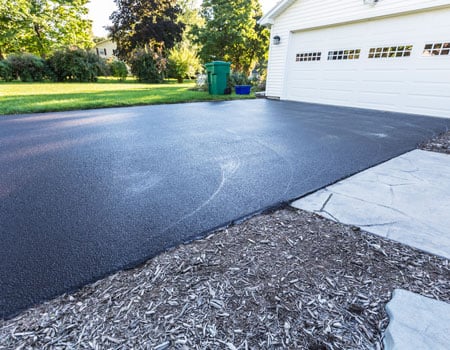Recognizing the Different Sorts Of Asphalt Paving Available Today
In the realm of construction and framework, an extensive understanding of the numerous kinds of asphalt paving is important for optimum job outcomes. From the durable Hot Mix Asphalt, developed for high-traffic locations, to the eco conscious Porous Asphalt that assists in water monitoring, each kind offers distinct benefits tailored to certain requirements.

Hot Mix Asphalt
What makes hot mix asphalt a preferred choice for road construction and repair work? Hot mix asphalt (HMA) is favored for its sturdiness, flexibility, and efficiency under varying conditions. Composed of a mixture of aggregates and fluid asphalt concrete, HMA is generated at high temperatures, usually between 300 ° F and 350 ° F (asphalt paving acworth ga). This high-temperature application permits optimal bonding and compaction, causing a smooth, resilient surface that can hold up against heavy traffic loads and damaging weather.
HMA's ability to be tailored to details project requirements is one more considerable benefit. Different ranks and solutions can be made use of to enhance residential properties such as flexibility, resistance to contortion, and longevity. Furthermore, warm mix asphalt can be quickly installed and opened to website traffic, minimizing disturbance during building and construction.
Ecological considerations likewise play a role in the preference for HMA. The product is recyclable, and recovered asphalt pavement (RAP) can be reused, promoting sustainability in roadway construction practices. Overall, hot mix asphalt sticks out as a reputable option, effectively giving a resilient, high-performance surface area that meets the demands of contemporary facilities.
Cold Mix Asphalt
Cold mix asphalt is a functional alternative to hot mix asphalt, particularly matched for particular applications such as patching and surface therapies. This kind of asphalt is produced at ambient temperature levels, allowing for much easier handling and application without the need for substantial home heating equipment.
Generally made up of asphalt solutions or lowerings, chilly mix asphalt can be mixed on-site or bought pre-mixed. Its residential properties enable it to bind well with existing sidewalk, making it an efficient service for repairing gaps, splits, and other surface area flaws. In addition, it can be used in a range of climate condition, giving a useful alternative for year-round upkeep.

Nevertheless, while cold mix asphalt is optimal for short-lived repairs, it might not supply the same long life or sturdiness as hot mix asphalt under rush hour problems. Therefore, it is ideal utilized for low-traffic locations or as a temporary service till more long-term repair work can be performed.
Warm Mix Asphalt
While warm mix asphalt has actually long been the criterion for road construction, cozy mix asphalt (WMA) has arised as an ingenious alternative that balances performance with ecological factors to consider. WMA is created at considerably reduced temperature levels-- typically between 215 ° F and 275 ° F-- contrasted to warm mix a knockout post asphalt, which is heated to around 300 ° F. This decrease in temperature level not only decreases power consumption yet additionally lowers greenhouse gas exhausts during production.
The modern technology behind WMA involves the usage of ingredients or strategies that enable much better workability at reduced temperatures. These can consist of chemical additives, frothing procedures, or a combination of both. Therefore, WMA maintains the required residential or commercial properties for toughness and efficiency while offering a much more eco pleasant choice.

Porous Asphalt
Permeable asphalt stands for a forward-thinking approach in sidewalk layout, focusing on both performance and environmental sustainability. This cutting-edge material is particularly engineered to enable water to penetrate through its surface area, efficiently minimizing runoff and promoting groundwater recharge. Therefore, permeable asphalt is a superb selection for areas susceptible to flooding or where stormwater administration is crucial.
The structure of permeable asphalt varies from conventional asphalt, featuring a higher percent of voids that promote drain. This building not just minimizes surface area water accumulation however also helps minimize problems like hydroplaning and boosts lorry grip during damp problems. asphalt paving acworth ga. Additionally, see post permeable asphalt can add to metropolitan heat island reduction, as it permits greater dissipation and cooling impacts in city environments
In terms of setup, permeable asphalt calls for careful consideration of underlying drainage systems to ensure ideal performance. Upkeep generally includes regular examinations and cleaning up to protect against blocking from debris, which can impair its leaks in the structure. Generally, porous asphalt functions as a sustainable paving option that straightens with contemporary environmental goals, making it an increasingly popular option for both public and personal projects.
Rubberized Asphalt
Rubberized asphalt is a sophisticated paving material that integrates recycled rubber, usually sourced from scrap tires, right into the asphalt mix. This cutting-edge strategy not just improves the efficiency of conventional asphalt however additionally advertises environmental sustainability by recycling waste products. The enhancement of rubber enhances the flexibility and toughness of the pavement, making it resistant to fracturing and deformation under differing temperature conditions.
One of the considerable advantages of rubberized asphalt is its capability to lower sound pollution. The rubber particles soak up noise, resulting in quieter streets, which is particularly beneficial in city areas. Additionally, this sort of asphalt supplies improved skid resistance, enhancing security for automobiles.
Rubberized asphalt additionally contributes to extending the life expectancy of roadway surfaces, resulting in lowered maintenance expenses in time. This long life is especially useful for high-traffic locations where damage are accelerated. Furthermore, its resistance to moisture infiltration helps minimize the threat of water damage, additionally enhancing durability.
Verdict
In recap, the variety of asphalt paving kinds-- Warm Mix Asphalt, Cold Mix Asphalt, Warm Mix Asphalt, Porous Asphalt, and Rubberized Asphalt-- each satisfy distinct functions that satisfy diverse construction and upkeep needs. These choices not just improve roadway quality yet likewise add to sustainability via reduced energy consumption and improved water administration. Comprehending these differences is crucial for picking the suitable asphalt type, eventually ensuring efficient and reliable leading remedies in different atmospheres.
From the robust Warm Mix Asphalt, made for high-traffic areas, to the ecologically aware Porous Asphalt that helps with water management, each type provides unique benefits customized to specific requirements.Typically composed of asphalt emulsions or lessenings, chilly mix asphalt can be mixed on-site or acquired pre-mixed.While warm mix asphalt has long been the requirement for roadway construction, warm mix asphalt (WMA) has emerged as a cutting-edge option that stabilizes efficiency with environmental factors to consider.Rubberized asphalt is a sophisticated paving material that incorporates recycled rubber, normally sourced from scrap tires, into the asphalt mix.In summary, the range of asphalt paving types-- Warm Mix Asphalt, Cold Mix Asphalt, Cozy Mix Asphalt, visit this site Porous Asphalt, and Rubberized Asphalt-- each fulfill unique functions that provide to varied building and maintenance needs.
 Alfonso Ribeiro Then & Now!
Alfonso Ribeiro Then & Now! Ben Savage Then & Now!
Ben Savage Then & Now! Alisan Porter Then & Now!
Alisan Porter Then & Now! Michael C. Maronna Then & Now!
Michael C. Maronna Then & Now! Rossy de Palma Then & Now!
Rossy de Palma Then & Now!